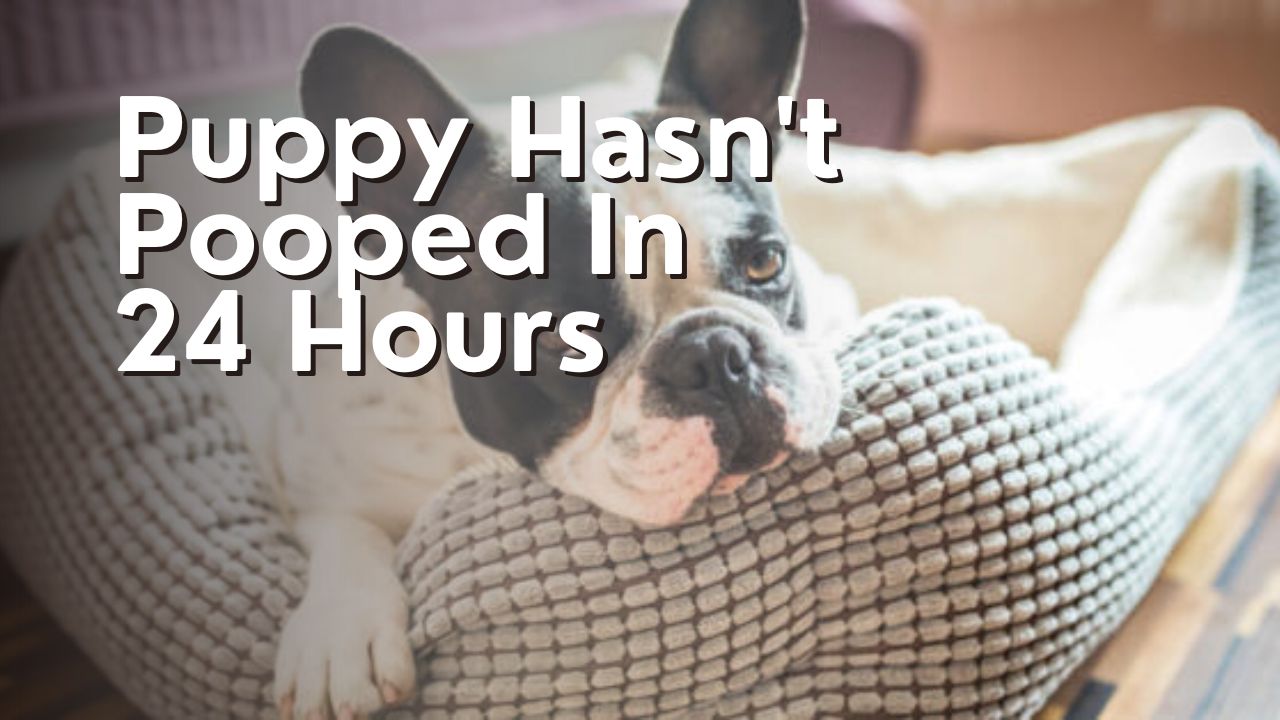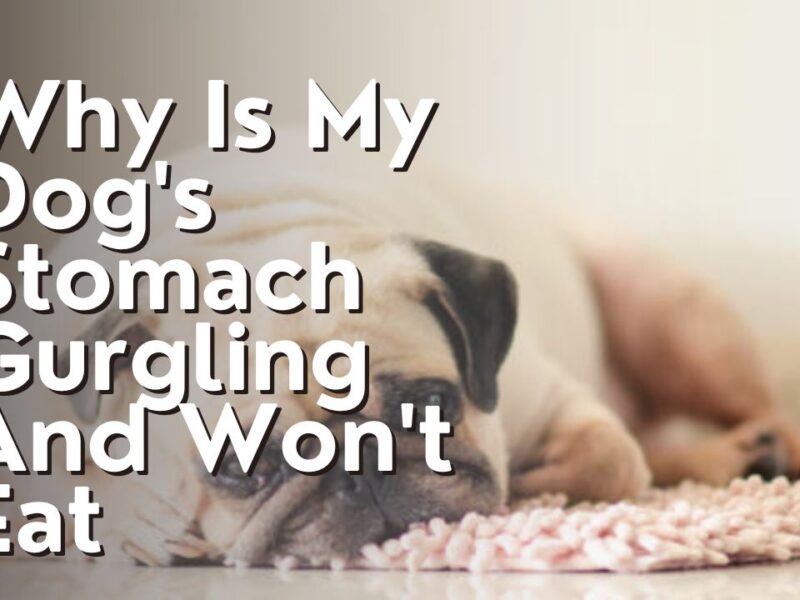Hey there! So, you’ve noticed that your puppy hasn’t pooped in 24 hours, and you’re starting to worry.
Don’t fret just yet! In this article, we’ll explore the common causes of constipation in puppies, the impact of dietary factors and dehydration on bowel movements, and when to seek veterinary assistance.
We’ll also share some tips on encouraging regular bowel movements and preventing constipation in your furry friend.
So, let’s dive in and find out how to keep your puppy’s digestive system happy and healthy!
- Common Causes of Constipation in Puppies
- Dietary Factors that may Affect Bowel Movements
- Dehydration and its Impact on Digestion
- Potential Medical Conditions to Consider
- How to Encourage Regular Bowel Movements
- The Importance of Regular Exercise
- When to Seek Veterinary Assistance
- Tips for Preventing Constipation in Puppies
- Understanding Your Puppy's Digestive System
- Maintaining a Healthy and Balanced Diet for Your Puppy
- Frequently Asked Questions
- Conclusion
Common Causes of Constipation in Puppies
You may be wondering what could be causing constipation in your puppy.
There are several common causes of constipation in puppies that you should be aware of.
One possible cause is a lack of fiber in their diet. If your puppy is not getting enough fiber, their stool may become hard and difficult to pass.
Another cause could be dehydration. When puppies don’t drink enough water, their body can’t produce enough moisture for their stool, leading to constipation.
Additionally, certain medications or medical conditions can also cause constipation in puppies. If your puppy is on any medication, it’s important to check with your veterinarian to see if constipation could be a side effect.
Lastly, stress or changes in routine can also contribute to constipation in puppies. Moving to a new home or experiencing a major life change can disrupt their normal bowel movements.
If your puppy hasn’t pooped in 24 hours, it’s best to consult with your veterinarian to determine the underlying cause and find the appropriate treatment.

Dietary Factors that may Affect Bowel Movements
Certain dietary factors can impact the frequency of bowel movements in puppies. It’s important to understand that what goes into a puppy’s body can greatly affect what comes out. One common cause of constipation in puppies is a lack of fiber in their diet. Fiber helps to add bulk to the stool and promotes regular bowel movements. If a puppy is not getting enough fiber, their stool may become dry and hard, making it difficult to pass.
Another dietary factor that can affect bowel movements is dehydration. When a puppy doesn’t drink enough water, their body tries to conserve it by absorbing more water from the stool. This can result in hard, dry stool that is difficult to pass. It’s crucial to make sure that your puppy has access to fresh water at all times to prevent dehydration.
Additionally, certain types of food can also cause constipation in puppies. Foods that are high in fat or low in fiber can slow down the digestive process and lead to constipation. It’s important to choose a balanced and nutritious diet for your puppy that includes the right amount of fiber and hydration to keep their digestive system functioning properly.
In conclusion, dietary factors play a significant role in a puppy’s bowel movements. Ensuring that your puppy has a diet that is rich in fiber, hydration, and balanced nutrients can help promote regular bowel movements and prevent constipation.
Dehydration and its Impact on Digestion
Make sure your puppy has access to fresh water at all times to prevent dehydration and maintain proper digestion. Dehydration can have a significant impact on your puppy’s bowel movements and overall digestive health. When a puppy is dehydrated, their body tries to conserve water by absorbing as much fluid as possible from the colon, resulting in harder and drier stools. This can lead to constipation and difficulty in passing stools. Adequate hydration, on the other hand, helps to soften the stools and promote regular bowel movements.
To help your puppy stay hydrated and ensure optimal digestion, here are three important tips to follow:
- Always provide your puppy with clean and fresh water. Make sure to change the water regularly to prevent any contamination or bacterial growth.
- Monitor your puppy’s water intake. Some puppies may not drink enough water on their own, so it’s important to keep an eye on their water bowl and encourage them to drink if needed.
- Consider adding moisture to your puppy’s diet. Mixing wet food or adding water to dry food can help increase their fluid intake and promote hydration.
By following these tips, you can help prevent dehydration and ensure that your puppy’s digestion stays healthy and regular.
Potential Medical Conditions to Consider
One potential medical condition to consider is gastrointestinal infection, which can cause changes in a puppy’s bowel movements. This infection occurs when harmful bacteria, viruses, or parasites enter the puppy’s digestive system and cause inflammation. It can lead to symptoms such as diarrhea, vomiting, loss of appetite, and abdominal discomfort.
To further emphasize the importance of considering gastrointestinal infection, here is a table highlighting the common symptoms, possible causes, and recommended actions:
| Symptom | Possible Cause | Recommended Action |
|---|---|---|
| Diarrhea | Bacterial or viral infection | Consult a veterinarian |
| Vomiting | Parasitic infection | Provide supportive care |
| Loss of appetite | Food poisoning | Monitor and offer bland diet |
If your puppy hasn’t pooped in 24 hours and is exhibiting any of these symptoms, it’s crucial to seek veterinary attention. The veterinarian may perform a physical examination, request stool samples for analysis, and prescribe appropriate medications. Additionally, they may recommend dietary modifications, such as a bland diet, to aid in the puppy’s recovery.
Remember, prompt diagnosis and treatment are essential in managing gastrointestinal infections and ensuring your puppy’s well-being.
How to Encourage Regular Bowel Movements
To encourage regular bowel movements, you can try incorporating fiber-rich foods into your puppy’s diet. Fiber adds bulk to the stool and helps promote healthy digestion.
Here are three ways to incorporate fiber into your puppy’s diet:
- Choose a high-quality puppy food that contains natural sources of fiber, such as whole grains, vegetables, and fruits. Look for ingredients like brown rice, sweet potatoes, and pumpkin.
- Add a small amount of canned pumpkin to your puppy’s meals. Pumpkin is not only rich in fiber but also contains moisture, which can help soften the stool and make it easier to pass.
- Consider giving your puppy treats that are specifically designed to promote healthy digestion. These treats often contain ingredients like oats, flaxseed, or psyllium husk, which are all high in fiber.
Remember to introduce any dietary changes gradually to avoid upsetting your puppy’s stomach. Additionally, make sure your puppy has access to fresh water at all times, as staying hydrated is important for maintaining regular bowel movements.
With these simple changes, you can help support your puppy’s digestive health and encourage regular bowel movements.
The Importance of Regular Exercise
After learning about how to encourage regular bowel movements in puppies, I want to emphasize the importance of regular exercise in maintaining a healthy digestive system.
As a pet owner myself, I have experienced firsthand how exercise plays a vital role in keeping my furry friend’s bowel movements regular.
Regular physical activity helps stimulate the muscles in the digestive tract, promoting better digestion and bowel movements. When a puppy engages in exercise, it increases blood flow to the intestines, which aids in the movement of waste through the digestive system. Additionally, exercise helps regulate metabolism, ensuring that food is processed efficiently and waste is eliminated regularly.
Not only does exercise benefit the digestive system, but it also provides numerous other health benefits for puppies. It helps them maintain a healthy weight, strengthens their muscles and bones, improves their cardiovascular health, and enhances their mental well-being.
To ensure your puppy gets enough exercise, engage in activities such as daily walks, play sessions, and interactive games. Remember to consider your puppy’s age, breed, and health condition when determining the appropriate amount and intensity of exercise.
By incorporating regular exercise into your puppy’s routine, you can promote a healthy digestive system, prevent constipation, and contribute to their overall well-being.
When to Seek Veterinary Assistance
If your puppy is experiencing prolonged periods without a bowel movement, it may be necessary to seek veterinary assistance. While it is normal for a puppy to have occasional skipped days, going 24 hours without pooping can be a cause for concern. As a responsible pet owner, it is important to monitor your puppy’s bathroom habits and take action if necessary.
One possible reason for the lack of bowel movements could be a blockage in the digestive system. This could be caused by ingesting a foreign object or a medical condition. If your puppy is showing signs of discomfort, such as vomiting or bloating, it is crucial to seek immediate veterinary attention.
Another reason to seek veterinary assistance is if your puppy’s lack of bowel movements is accompanied by other symptoms, such as loss of appetite, lethargy, or diarrhea. These could be signs of an underlying health issue that requires professional diagnosis and treatment.
In some cases, a change in diet or routine may help stimulate your puppy’s bowel movements. However, it is always best to consult with a veterinarian before making any changes. They can provide guidance tailored to your specific situation and ensure the well-being of your furry friend.
Remember, if your puppy hasn’t pooped in 24 hours and is showing signs of discomfort or other symptoms, it is important to seek veterinary assistance promptly. Early intervention can prevent further complications and ensure your puppy’s health and happiness.
Tips for Preventing Constipation in Puppies
- Feed them at the same time every day
- Avoid giving them table scraps or unhealthy treats
- Encourage regular exercise, such as daily walks or playtime
- Remember that preventing constipation is key to their overall health and well-being
- Let’s take care of our furry friends and keep them happy and comfortable!
Understanding Your Puppy’s Digestive System
Now that we’ve talked about tips for preventing constipation in puppies, let’s dive into understanding your puppy’s digestive system.
It’s crucial to grasp how their little tummies work to ensure their overall health and well-being.
A puppy’s digestive system is still developing and may not be as efficient as an adult dog’s. They have a smaller stomach and shorter intestines, which means food passes through their system more quickly. This rapid digestion can sometimes lead to loose stools or even diarrhea.
Additionally, puppies have a higher metabolic rate, which means they require more frequent meals. Their bodies absorb nutrients quickly, so they need to eat more often to maintain their energy levels. It’s important to feed them a balanced diet that supports their growth and provides the necessary nutrients.
Furthermore, puppies are curious creatures that tend to explore the world with their mouths. They might chew on things they shouldn’t, leading to potential blockages in their digestive tract. Keeping a close eye on what they ingest and providing appropriate chew toys can help prevent any issues.
Understanding your puppy’s digestive system is vital for their overall health. By being aware of their unique needs, you can ensure they’re getting the proper nutrition and avoid any potential digestive problems.

Maintaining a Healthy and Balanced Diet for Your Puppy
To maintain a healthy and balanced diet for your puppy, make sure to provide them with nutrient-rich meals that support their growth and energy levels. A well-balanced diet is essential for their overall well-being and can help prevent digestive issues.
Here are three important factors to consider when feeding your puppy:
- Choose high-quality puppy food: Look for a reputable brand that is specifically formulated for puppies. These foods are designed to provide the right balance of nutrients that puppies need for healthy development. Read the labels and opt for options that list meat as the main ingredient, as this ensures a good source of protein.
- Feed the right amount: Puppies have different nutritional needs than adult dogs, and it’s important to feed them the appropriate amount of food for their age, breed, and size. Overfeeding can lead to weight gain, while underfeeding can result in malnutrition. Consult your veterinarian to determine the right portion sizes for your puppy.
- Establish a feeding schedule: Puppies thrive on routine, so it’s beneficial to establish a regular feeding schedule. This helps regulate their digestion and prevents them from begging for food throughout the day. Divide their daily food intake into several small meals and feed them at the same times each day.
By following these guidelines, you can ensure that your puppy receives a healthy and balanced diet that supports their growth and keeps them energetic and happy.
Frequently Asked Questions
How often should a puppy typically poop?
Puppies typically poop multiple times a day, usually after meals. However, it’s important to note that every dog is different. If a puppy hasn’t pooped in 24 hours, it could be a sign of digestive issues and should be checked by a veterinarian.
Can stress or anxiety cause constipation in puppies?
Stress and anxiety can indeed cause constipation in puppies. It can disrupt their digestive system and lead to irregular bowel movements. It’s important to address their stress and provide a calm environment to help regulate their bowel movements.
Is it normal for a puppy to strain while trying to poop?
It is normal for a puppy to strain while trying to poop occasionally. However, if it persists or is accompanied by other symptoms like lethargy or loss of appetite, it’s best to consult a veterinarian.
Are there any home remedies to relieve constipation in puppies?
There are home remedies to relieve constipation in puppies such as adding pumpkin or fiber to their diet, increasing their water intake, and gentle exercise. It’s important to consult a vet for proper guidance.
Can certain medications cause constipation in puppies?
Certain medications can cause constipation in puppies. It is important to consult with a veterinarian to determine if the medication is causing the issue and to explore potential remedies.
Conclusion
In conclusion, it is important to understand the common causes of constipation in puppies and how to address them.
By paying attention to their diet, ensuring they are properly hydrated, and seeking veterinary assistance when necessary, we can help our puppies maintain regular bowel movements.
Additionally, preventing constipation through a healthy and balanced diet is key.
By taking these steps, we can ensure our puppies stay happy and healthy.


